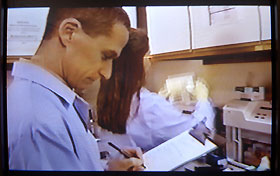For more archives, go to the Advance Archive/Search Page.
Dehydration A Danger At
Summer Sports Camps, Study Finds
Fun in the summer sun can be risky, particularly for young athletes who don't drink enough fluids.
According to a new study, children at summer sports camps are at risk for heat exhaustion and heat stroke. "They're not drinking enough fluids and are dehydrated," says Douglas Casa, an associate professor of kinesiology and director of athletic training education at UConn.
 |
Douglas Casa, an associate professor of kinesiology, appears in a television public service announcement about the dangers of dehydration in children. In the background is Susan Walker-Yeargin, a Ph.D. student.
|
Casa, who studied children at summer soccer camps in Pennsylvania, found that two-thirds of the campers were significantly dehydrated before they even started practice.
This puts them at risk for serious heat-related illnesses, he says.
"Even though water and sports drinks were readily available, frequent rest breaks were provided, and coaches encouraged the kids to drink, the children didn't drink adequate amounts of fluid," Casa says. "They were more focused on having fun, socializing, and relaxing during their rest breaks.
"The big message is that kids really didn't understand the concept that when they're sweating during exercise, the fluids have to be replaced," he adds. "While I expected to see some dehydration, I was surprised at just how many children were dehydrated and the extent to which they were dehydrated."
Once children are dehydrated, it's hard for them to catch up, Casa says.
The study included 34 boys and 24 girls between the ages of 10 and 14 who were enrolled in four days of soccer camp. Campers participated in two to three practices each day. Before the first practice and after the second practice, researchers analyzed samples of their urine to find out their level of hydration.
Casa says this is the first field study of children evaluated over successive days while exercising in the heat.
The research was presented at the annual meeting of the American College of Sports Medicine in June. It was commissioned by the "Defeat the Heat" public safety campaign, which is designed to protect active children from the dangers of dehydration and heat-related illness. The initiative is
an effort of the National Safe Kids Campaign and the National Athletic Trainers' Association.
These organizations also created a 30-second public service announcement to provide parents with tips about hydration. It has aired nationwide since June and will run through the summer. Casa is among those featured, along with Dan Marino, former quarterback of the Miami Dolphins, and a cast of extras including children of some UConn faculty and staff.
"Young athletes should drink water or sports drinks before, during, and after activity to replace what they have lost through sweat," Casa says. "Parents, coaches, and others who work with children need to be aware of the dangers of dehydration, and take steps to ensure that children are educated about the importance of hydration and are drinking enough."

